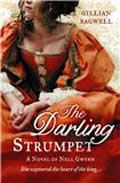 Gillian Bagwell. I knew her when. When she was a student at Berkeley High where I taught English and drama. Effervescent, talented. Lost track of her, reconnected via Facebook (where else?) discovered she’d spent her years successfully writing, directing, performing and has now become an international author of some note with her debut novel, The Darling Strumpet.
Gillian Bagwell. I knew her when. When she was a student at Berkeley High where I taught English and drama. Effervescent, talented. Lost track of her, reconnected via Facebook (where else?) discovered she’d spent her years successfully writing, directing, performing and has now become an international author of some note with her debut novel, The Darling Strumpet.
Even before opening it, I gave her book a couple of nominations for Writer Working 2011 awards–Cover–can’t imagine anyone’s going to do better than the “bodice among oranges” art work here–and Title. A shame that the word “strumpet” has passed from use. Seems like sex these days is either pornographic or earnest. Little that’s cute and teasy. Not that prostitution and mistresshood were ever without their cruel and seamy reality. Not that we should turn our heads and ignore the brutality. But fun is fun and we shouldn’t be afraid of admitting–nay celebrating–it.
And Bagwell doesn’t stick with the cute side of Nell’s story. in word and deed, her subject brands herself a whore and is subject to all the manipulations and victimization of her profession. But she’s a very special whore, and The Darling Strumpet lets us experience the how and why of her life and character. That’s what makes historical fiction both entertaining and educational, delivering what Dr. Johnson (I think it was he.) termed “edification and delight.”
I knew about Nell Gwynn, knew something about Charles II and how he brought color and passion back to English life after the gray Puritan years following his father’s beheading, initiated the period of English history that has become known as The Restoration. But I didn’t know very much. Edification. I knew Nell was an actress cum (pun intended) mistress to the king, a popular public figure of her age, but knew nothing of her caring and ebullient personality. Delight.
Raised a waif in London slums with a cruel mother who works her to the bone and beats her besides, Eleanor Gwynn is a model of what would later become a Dickensian heroine. But she has a taste for baubles and, with an older sister who’s already turned bawd, no taste for Victorian virtues. She turns her first trick at fourteen, endures her first rape later the same day–the same day she first sets eyes on her king and future master.  It’s not long before she’s ensconced full time in her sister’s brothel and earning an adequate, if brutal, living.
It’s not long before she’s ensconced full time in her sister’s brothel and earning an adequate, if brutal, living.
Next step–the theater. Actors have needs, and she meets and attracts the affection of one in particular, and he introduces her to the world of drama. Then comes an artistic revolution. The king decides to allow women on stage–In England, all women’s parts had been played by boys till then, one of the reasons Shakespeare wrote so few–even if they are so eternally powerful–parts for women. But that’s another subject. Nell steps from selling herself in the bawdy house to selling oranges in the theater to selling her acting talents to adoring audiences. Next step, the king himself.
I suppose The Darling Strumpet qualifies as, among other things, a romance novel (Gillian intimates as much in a Facebook remark re the booming English sales of the book.), and I’ve not read much of the genre, but the graphic sex and descriptions of 17th C. birth control would make Barbara Cartland blush. Well and good. We need to plunge into the uglies as well as the glories of the likes of Nell and her sisters.
Bagwell narrates all this in lively prose with language that keeps enough flavor of the period (“The king comes back this day,” for example”) to keep mind and spirit in seventeenth century London, but not so heavy-laden with such as to sound phony or to keep one at arm’s length from the story. A neat balancing act. We move through Nell’s triumphs and perils completely in her thrall, feeling we know and feel all.
To add dimension, Gillian gives occasional Shakespearean lines in her thought and speech. Might seem odd, since she’s illiterate, but we see her watching The Tempest and Henry I, I, and her memorization skills were obviously highly tuned to learn by heart the many scripts she performed. Those great lines add immensely to the work.
I do have a couple a small caveats.
First, because of how Nell’s life progressed, the book loses dramatic tension after Charles takes her in and she bears him a son. She’s not in nearly so much danger after that–despite minor threats from his other paramours–as before, so the perils don’t loom as dramatically. There are some excellent scenes, such as the card scene where she–well I won’t tell you what happens. That and the very touching scenes of Charles’s death and her own (“probably pox,” i.e., venereal disease in her early thirties) make for excellent reading on their own.
Still, this is quite book about quite a character who deserves more recognition than she’s received. And quite an author who is beginning to receive the recognition she absolutely deserves. Brains, beauty, guts. Who could resist? Certainly not bonny Prince Charlie. Nor anyone who picks up The Darling Strumpet.
